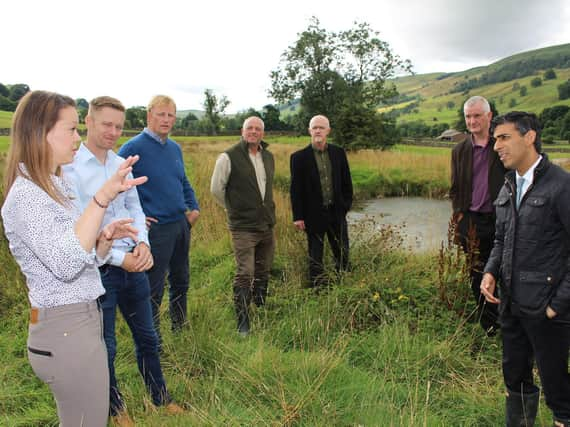Natural flood management project by Yorkshire Dales Rivers Trust gives wildlife an unexpected boost


The project, run by the Yorkshire Dales Rivers Trust in Bishopdale, has seen a resurgence in wildlife following work to slow the flow of Bishopdale Beck, a tributary of the River Ure.
Rishi Sunak, MP for Richmond (Yorks), heard about the success of the £270,000 project – funded by the Department of the Environment, Food and Rural Affairs – during a visit to Ribba Hall Farm.
Advertisement
Hide AdAdvertisement
Hide AdMeasures to slow the flow through the dale include tree planting and hedging, ‘leaky’ dams and scrapes – temporary ponds which hold water during periods of heavy rainfall.
Bishopdale farmer Andy Whitell said he was delighted with the early outcomes of the project even though it had only just been completed.
“We have already seen the impact of the leaky dams and the scrapes on our farm. The yard used to flood regularly at times of heavy rain but that has lessened considerably.”
Mr Whitell said the way wildlife had responded was the most surprising aspect of the scheme.
Advertisement
Hide AdAdvertisement
Hide Ad“We have five barns on the farm and four of them now host owls – tawny, barn and little owls – which is evidence of how the scheme has improved the habitat here.
“Last year we had salmon spawning in the beck for the first time in years and this year we have seen otters and kingfishers.”
Mr Whitell, who farms Ribba Hall with his partner Ashleigh Moorhouse, said they had been very keen to improve the farm’s environment since they bought it six years ago.
Robert Brown, a Yorkshire Dales Rivers Trust trustee, said the project had worked with 10 farms in the dale and the Yorkshire Dales National Park Authority to draw up individual plans for each farm.
Advertisement
Hide AdAdvertisement
Hide AdDuring the course of the three-year programme 28,000 trees and 4.5km of hedges were planted at a range of sites and targeted to intercept overland flow and flood pathways. Twelve leaky dams and 17 shallow scrapes were installed to slow the flow of the beck and its tributary streams.
Mr Brown said: “The project started with engaging landowners across the catchment with hydrological opportunity modelling and evidence-based NFM farm plans.
“These helped identify the possible interventions to reduce flood risk through intercepting, slowing and/or holding water within the catchment.
“These were co-designed with the landowners and the Yorkshire Dales National Park Authority and the majority of large intervention such as scrapes, fencing and large leaky dams were installed by local agricultural contractors.
Advertisement
Hide AdAdvertisement
Hide Ad“Volunteers were used to help with activities such as tree and hedgerow planting, creation of dams and assisting with monitoring.”
Mr Brown said the Yorkshire Dales Rivers Trust was working on a range of schemes across the county designed to improve flood management, water quality and biodiversity of wildlife in rivers and adjacent banks.
These included a natural flood management project in Arken-garthdale, an area badly affected by the floods of July 2019, and one called Keep Ure River Cool – a scheme to increase tree planting on the banks of the River Ure from its headwaters to its confluence with the Swale to reduce river water temperature for the benefit of fish populations, other wildlife and flood management.
Mr Sunak said he was delighted to see the project delivering benefits both in terms of flood risk and wildlife.
Advertisement
Hide AdAdvertisement
Hide Ad“We have seen the devastating impact of flooding in the Dales very recently and I applaud initiatives like the Bishopdale project which will contribute to lessening the risk to land, property and livelihoods from future flood events.
“It is also good to know that slowing the flow in the Upper Dales has benefits here but also much lower down the catchment in York.
“Improving diversity is a very welcome bonus.”
Comment Guidelines
National World encourages reader discussion on our stories. User feedback, insights and back-and-forth exchanges add a rich layer of context to reporting. Please review our Community Guidelines before commenting.